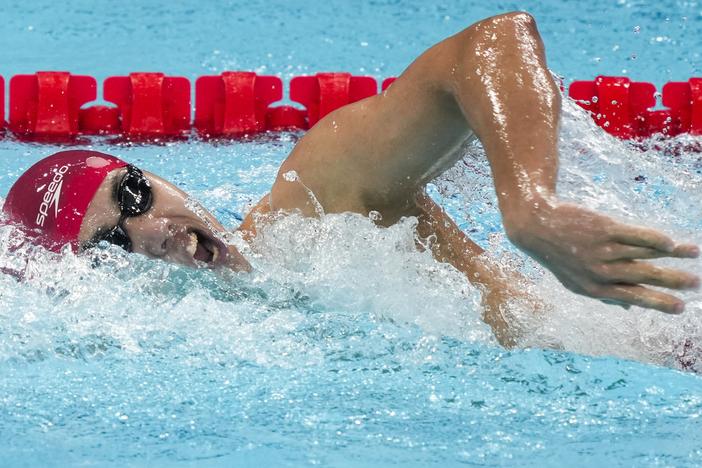Section Branding
Header Content
Gymnast Rebeca Andrade Won Gold For Brazil, And Became A National Hero
Primary Content
Brazilians are desperate for heroes right now, and it looks like they have found one: Rebeca Andrade is the first Brazilian woman to win an Olympic medal for gymnastics.
Transcript
LULU GARCIA-NAVARRO, HOST:
Women's gymnastics are one of the great showpieces of the Olympics, especially the individual all-around competition. Americans are still savoring Suni Lee's gold medal in that contest on Thursday after Simone Biles withdrew. That sport is also creating another big star who's being celebrated today in Brazil. We are joined now by NPR's Philip Reeves in Rio de Janeiro. Hello.
PHILIP REEVES, BYLINE: Hello.
GARCIA-NAVARRO: Happy news from Brazil. Tell us about this...
REEVES: Yes, indeed.
GARCIA-NAVARRO: Yeah. Tell us about this gymnast.
REEVES: She's Rebeca Andrade, and she won the silver medal in that contest. And that has earned her a place in Brazilian sports history because it makes her the first Brazilian woman gymnast to win an Olympics medal. Her personal story's remarkable. She's 22. She's Black. She comes from a poor, working-class neighborhood in Sao Paulo. She's daughter of a single mom who has eight kids and used to clean houses and would walk to work to save money for Rebeca's training. And she's also - Rebeca's also had lots of battles against injuries, and so now she's become a symbol of what can be achieved against the odds.
GARCIA-NAVARRO: How are Brazilians reacting?
REEVES: Well, you know, Lulu, Brazil's been going through a terrible, utterly miserable time. More than 550,000 people have been killed by COVID. That's the second highest number in the world. And under the far-right president, Jair Bolsonaro, this country's painfully polarized, like the U.S. So people here are desperate for joy.
GARCIA-NAVARRO: Yes.
REEVES: They're hungry for heroes. And Rebeca is certainly satisfying that need. She's getting huge coverage in the media. We've had TV commentators bursting into tears. Social media is going nuts over her. She's a very charismatic figure. She seems to radiate warmth and excitement, and people have just fallen in love with her.
GARCIA-NAVARRO: Well, we should say Brazilians don't do things halfway. But for those who don't know Brazil, I mean, how challenging was it for a Black Brazilian woman from a poor background to achieve something like this?
REEVES: It's very hard, which is why Rebeca's success is about a lot more than sports. It's being embraced here as an inspiration for women, for Black women in particular. People think it's significant that on Thursday she used a piece of music called "Baile De Favela," which is funk that comes from Brazil's favelas. Those are the low-income neighborhoods that are the hub of the African Brazilian culture. And, you know, this issue's a big deal because there's profound institutional racism here. Even though more than half the population's Black or mixed race, it's hard for Black people to reach the top, especially women, and that's true in business, in politics and also sports. To learn a little more about this, I called Julia Belas. She's a Black journalist who writes for Folha. And she says Rebeca Andrade has had to overcome a lot of obstacles.
JULIA BELAS: I work with sports, and I see every day how gender and race are acting all the time to keep young, Black women from sports.
REEVES: Julie (ph) says that she saw Rebeca win her silver live on TV.
BELAS: I cried (laughter) a lot. It was amazing.
GARCIA-NAVARRO: I mean, Rebeca has been in action in Tokyo again today, right?
REEVES: Yes, she has, in the vault contest. So a lot of Brazilians got up early to watch on TV, even though it's Sunday morning. And guess what? She won gold.
GARCIA-NAVARRO: Yay.
REEVES: MyKayla Skinner, who's American, of course, took the silver. So there are more tears of happiness here and more celebrations this morning, and I'm sure they'll go on all day. This is only Brazil's second gold so far in these games. And tomorrow, Rebeca's competing again, and I'm sure Brazilians will again get up early to watch in the hope that she snags a third medal.
GARCIA-NAVARRO: Well, have a caipirinha for me. That's NPR's Philip Reeves...
REEVES: I will.
GARCIA-NAVARRO: ...(Laughter) In Rio de Janeiro. Thank you very much.
REEVES: Thanks, Lulu. Transcript provided by NPR, Copyright NPR.
Bottom Content



